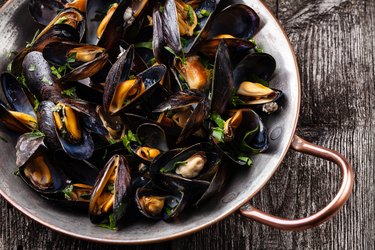
Vitamin B12 deficiency is one of the most common health concerns worldwide, affecting 1.5 to 15 percent of Americans. But high B12 levels in the bloodstream are not necessarily a good thing. Too much of this nutrient could be a sign of liver disease, leukemia or other disorders, according to the Mount Sinai Health System. The good news is, you can naturally lower your vitamin B12 levels through simple dietary changes.
The Role of Vitamin B12
Video of the Day
This water-soluble nutrient plays a key role in the production of DNA and red blood cells. It's also known as cobalamin and has the most complex structure of all vitamins, according to the Linus Pauling Institute. Most dietary supplements contain cyanocobalamin, the primary form of vitamin B12.
Video of the Day
Along with other B-complex vitamins, cobalamin regulates homocysteine metabolism. Elevated homocysteine levels have been linked to a higher risk of stroke, heart attack and cardiovascular problems. Sometimes, they may indicate an underlying condition, such as kidney or heart disease.
Vitamin B12 may also protect against depression, dementia and other mental illnesses. As the NIH points out, low levels of this nutrient can lead to cognitive decline.
A study conducted on 140 elderly patients and published in the Journal of Health Sciences in December 2014 shows a direct link between vitamin B12 deficiency and depression in seniors. All subjects who were deficient in this nutrient reported depressive symptoms.
About 75 to 90 percent of people who don't get enough vitamin B12 experience mood swings, incontinence, numbness in the limbs, irritability and other neurological symptoms, according to the Journal of Health Sciences study. Further, 20 percent of older adults may be deficient in this nutrient. Vitamin B12 levels below or above 160 to 950 picograms per milliliter (pg/mL) are considered abnormal and may indicate a more serious condition.
Dangers of High B12 Levels
Vitamin B12 deficiency has been linked to fatigue, cognitive problems, poor balance and other symptoms that may interfere with your daily life. If left unaddressed, it may lead to pernicious anemia, a disorder that causes fatigue, headaches, angina and irregular heartbeat.
Considering these facts, it makes sense to take vitamin B12 supplements and fill up on foods containing this nutrient. However, more isn't always better. High B12 levels may cause nausea and vomiting, headaches, anxiety or dizziness, according to the Mayo Clinic.
Cobalamin is water soluble, so any excess is excreted in the urine. In fact, no upper limit has been established for this nutrient. Excess vitamin B12 in the blood, though, may indicate an underlying disorder. A February 2013 review in QJM: An International Journal of Medicine suggests that elevated cobalamin levels could be a sign of breast, colon, stomach, liver or pancreatic cancer.
Researchers note that alcoholism, vitamin B12 shots and dietary supplements may cause high vitamin B12 levels too. The National Institutes of Health recommends a daily intake of 2.4 micrograms of cobalamin for adult men and women, 2.6 micrograms for expecting mothers and 2.8 micrograms during breastfeeding.
If you're expecting a baby, it's even more important to monitor your nutritional status. A January 2018 study published in Paediatric and Perinatal Epidemiology found that pregnant women with high plasma levels of folate and vitamin B12 were more likely to give birth to children with autism spectrum disorder.
Reduce Your Vitamin B12 Levels
As you see, most studies are conflicting. On the one hand, medical professionals state that there's no such thing as too much vitamin B12 in the bloodstream. On the other hand, research shows that side effects may occur. If your vitamin B12 levels are above normal, consider changing your eating habits.
Don't fret, though. Few foods contain this nutrient, so there's no need to make major changes to your diet. To start, limit your intake of beef, dairy, fish and seafood.
Clams, for example, provide 84.1 micrograms of vitamin B12 per serving, as per the NIH — that's about 1,400 percent of the daily recommended intake. One serving of beef liver delivers 70.7 micrograms of vitamin B12, while lamb liver has 101.76 micrograms of vitamin B12 per serving.
Other vitamin B12-rich foods include sardines, tuna, rainbow trout, nutritional yeast, egg yolks and fortified foods. Fruits, vegetables, nuts, seeds and legumes don't contain vitamin B12. Whole grains, orange juice, almond milk, rice milk and soy-based meat substitutes are often B12 fortified, so remember to check the labels.
Switch to multivitamins and other supplements that contain little or no cobalamin. Get regular blood tests to check your vitamin B12 levels. If they are still high, consult your doctor who may order additional tests to check for underlying conditions.
- NIH.gov: "Vitamin B12 Deficiency"
- Mount Sinai: "Vitamin B12 level"
- Linus Pauling Institute: "Vitamin B12"
- NIH.gov: "Vitamin B12"
- University of Rochester Medical Center: "Homocysteine"
- Journal of Health Sciences: "Vitamin B12 Deficiency and Depression in Elderly: Cross-Sectional Study in Eastern Croatia"
- MedlinePlus: "Vitamin B12 Level"
- Harvard.edu: "Vitamin B12 Deficiency Can Be Sneaky, Harmful"
- NIH.gov: "Pernicious Anemia"
- Mayo Clinic: "Vitamin B-12"
- QJM: An International Journal of Medicine: "The Pathophysiology of Elevated Vitamin B12 in Clinical Practice"
- NCBI - Paediatric and Perinatal Epidemiology: "Maternal Multivitamin Intake, Plasma Folate and Vitamin B12 Levels and Autism Spectrum Disorder Risk in Offspring"
- USDA: "Lamb, Variety Meats and By-Products, Liver, Raw"